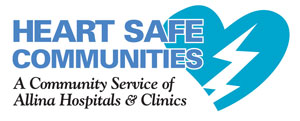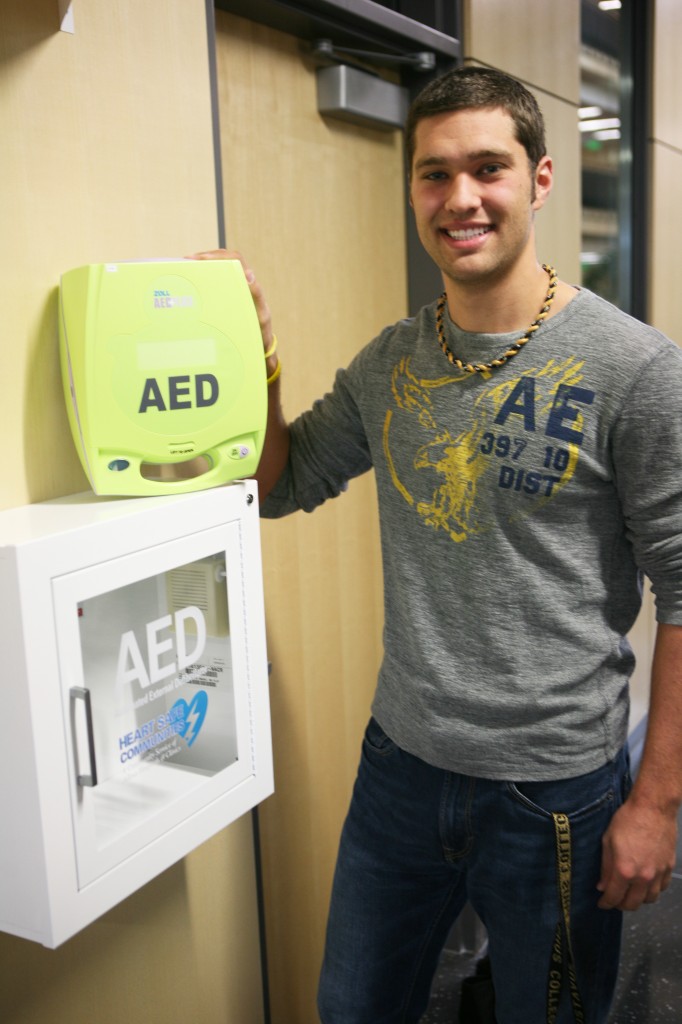As Gusties, students are told time and time again to make their lives count. It’s put on t-shirts, posters, and mentioned in countless speeches. The question is, how do you really make your life count? It can’t be done just by going to class, studying for an exam, or doing well on a paper. In order to make your life count, it is important to take classroom knowledge, combine it with passion, and apply it to real life situations. Joe Thayer ’15 has done just that.
As a first-year at Gustavus last fall, Thayer didn’t wait for anyone else to take the lead. He got involved with activities, including becoming a member of Student Senate, a student representative to the Board of Trustees, as well as a student representative to the Faculty Committee on Student Life. Thayer, like many Gusties, became heavily involved in campus life, but he also worked diligently in his classes. And when he found a problem, he went after it to find a solution.
“Within the first month, I noticed the lack of AEDs on campus,” Thayer said. “I asked several offices why we didn’t have more and nobody had a real good answer for me.” AEDs or automated external defibrillators are used when the heartbeat of an individual reaches an irregular pattern that is life threatening and are designed for use by laymen in almost any setting. Thayer began the AED project in October of 2011, and was able to become a better advocate through one of his spring semester courses: Public Discourse with professor Pamela Conners.
“The course is designed to have students engage with their communities directly, and, in that process, learn about what it takes to identify an issue, explore it through research, advocate for a way to address the issue, and learn to communicate effectively with a wide constituency within their communities,” Conners stated. “Students learn these skills in the process of actually doing something that makes a difference in their communities. They also learn about their own ability to make a difference,” Conners continued, adding that Thayer was incredibly passionate about the issue he decided to address. By funneling that passion through this communication studies course, he was able to make a difference for current Gusties, faculty, staff, campus visitors, and future students.
For Thayer, this community focus was what the course was all about. It wasn’t simply about a grade for class, but rather, it focused on the possibility of saving lives. This goal was worth all of the time spent contacting the many groups on campus that he needed support from, including campus safety, health services, athletic training, and the physical plant. Thayer also had to meet with administrators, including President Ohle, to discuss logistics and the importance of the project.
“Everyone [in those organizations] loved the idea but they were worried about the finances,” Thayer said. Still, he was determined not to let this obstacle derail the project.
Assistant Director of Campus Safety Dale Plemmons is one individual who helped Thayer through some of the hurdles he encountered. “Joe has been very dedicated in seeing this thing through. We just tried to help him along because this is definitely a worthy opportunity for Gustavus. We really want Joe to take the credit for this because he’s taken it to the next level and has done an awesome job.”
With the help of his dad, Thayer contacted EMT manager of Allina Health, Bruce Hildebrant to discuss prices for the AEDs. Allina volunteered their labor and processing for the four AEDs that Gustavus purchased, which cut the price of each AED almost in half. With a more reasonable price negotiated, college officials made the decision to purchase four additional AEDs for various locations on campus. In addition to the newly purchased AEDs, Thayer advocated to have some of the current AEDs moved to more public places.
“It’s dangerous to have them locked and inaccessible, because a longer time lapse before an AED is used, the lower the success rate,” Thayer explained. The likelihood of an AED revival decreases by 10 percent every minute that someone suffering from sudden cardiac arrest goes unaided. One of Thayer’s main goals is to eventually have AEDs spread throughout campus only a minute and a half apart. This means that, should an AED be needed, it would be a three minute lapse at most between leaving the patient and returning to them with the AED. “The American Heart Association really stresses the importance of time and initiating AED use within three minutes of the patient’s cardiac arrest,” Thayer said.
 Thayer is a Biochemistry and Molecular Biology major on a pre-med track. Besides his work with AEDs at Gustavus, Thayer has also advocated for AEDs at Turtle Bay Resort in Oahu, Hawaii. Thayer is a first responder and has helped train more than 60 people in bystander CPR and AED training. On September 20, 2012, Thayer received the Heart Safe Champion award for his work on campus and was one of only three individuals in Minnesota to receive this award. His work has also helped the college earn the award of being a Heart Safe Community. This title, which is bestowed by Allina Health, is given to communities and organizations that educate citizens about sudden cardiac arrest and improving heart health; that raise money to make AEDs available in businesses, schools, and other public gathering places; and that train people how to use AEDs and perform CPR. Gustavus is the first institute of higher education in the Midwest to receive this award. “I hope this will set a precedent for other institutions,” Thayer said.
Thayer is a Biochemistry and Molecular Biology major on a pre-med track. Besides his work with AEDs at Gustavus, Thayer has also advocated for AEDs at Turtle Bay Resort in Oahu, Hawaii. Thayer is a first responder and has helped train more than 60 people in bystander CPR and AED training. On September 20, 2012, Thayer received the Heart Safe Champion award for his work on campus and was one of only three individuals in Minnesota to receive this award. His work has also helped the college earn the award of being a Heart Safe Community. This title, which is bestowed by Allina Health, is given to communities and organizations that educate citizens about sudden cardiac arrest and improving heart health; that raise money to make AEDs available in businesses, schools, and other public gathering places; and that train people how to use AEDs and perform CPR. Gustavus is the first institute of higher education in the Midwest to receive this award. “I hope this will set a precedent for other institutions,” Thayer said.
Through the Public Discourse class and the AED project, Thayer has been able to develop and enhance his advocating, leadership, and communication skills in ways that have made a difference for Gustavus as well as for himself. His consideration for the community’s safety, awareness about AEDs, and knowledge concerning heart health, combined with his dedicated and driven desire to serve the campus and remedy the problem at hand, exemplifies the College’s core value of excellence.
“I don’t know if I could have gotten this done at a public school or another institution,” he said, “A lot of people here helped me pull this off and I had a lot of support.” Joe’s success and the support he received from the Gustavus community is just one example of how Gustavus aims to provide opportunities for students to step up and immerse themselves in their passions.
Thayer has worked hard to bring the project to where it stands today, but he says he isn’t done yet. “My personal goal for Gustavus is to have 20 AEDs by 2015. I still have to keep pushing this project forward, I’m not done yet, and I still have two years left,” he said.
AEDs on campus are now located in public areas in Christ Chapel, Björling Recital Hall, Beck Hall, across from the Center for Servant Leadership in the O.J. Johnson Student Union, near the Information Desk in Lund Center, and two are located in the Jackson Campus Center, including one near the Book Mark and another outside the Evelyn Young Dining Room. In addition, three AEDs are available for Campus Safety officers to carry with them while they’re on duty, one is located in the Performance Lab in Lund Center, and two are on hand for the College’s athletic training staff.
On Thursday, Nov. 1, Thayer has organized three 30-minute training sessions regarding CPR and AED operation. The sessions will take place in Lund Center at 12:30-1 p.m., 1:30-2 p.m., and 2:30-3 p.m. You can sign up to attend a session at the SAO desk in the Campus Center or simply drop in.
###
Media Contact: Director of Media Relations and Internal Communication Luc Hatlestad
luch@gustavus.edu
507-933-7510

Way to go Joe! Proud of you 🙂 Mrs. Shanda Henk, St Croix Falls School District
Incredible insight for current and future need of the community! Great service to Gustavus; going from idea, to initiate, to the actual implementation was impressive. Keep the momentum going within the school and hopefully throughout the country. Thank you for making a difference.
Congratulations, Joe! Keep up the great, life-saving work.